Leading the Charge: Execution Labs' First Cohort
The Firemasters, Henchmen, Big Action Mega Fight, MacGuffin Quest, Afterland: Jason Della Rocca's incubator turns up the heat
If you're looking for a games industry contact book, there are very few better places to find yourself than at the door of Jason Della Rocca. The ex-IGDA head is a permanent feature at conferences and shows around the globe, co-founding the perennially excellent Rant sessions at GDC and turning up almost everywhere else to offer advice, introductions and support to anyone who's happy to shake his hand.
Having spent the last few years offering consultation professionally via his old venture: Perimeter Partners, it makes sense that he'd turn to the incubator and mentoring business, forming new company Exection Labs in 2012. Together with co-founders Alex Normand and Keith Katz, Della Rocca has put together a 'first cohort' of five teams (see below for details) which are currently under tutelage and guidance at the company's Montreal base. These teams are expected to spend anywhere from six to twelve months with the Lab after joining the programme, with a rolling registration for new applicants as others graduate via release.
Whilst there's a strong focus on mobile and free-to-play among these first few, Della Rocca tells me that the real criteria for the selection process was the quality of the team members themselves.
"So much of what we looked for was the team, the talent. We almost didn't look at the ideas at all," Della Rocca explains to me. "It's so hard to predict the next big thing: is it ninjas, is it robots or dinosaurs - who knows? Even the most experienced publishers get it wrong all the time. We looked at the talent, their history and what they'd done before. Had they been to hell and back? Are they open and flexible, can they take criticism well, are they quick learners, do they have cohesion and rapport in the team?
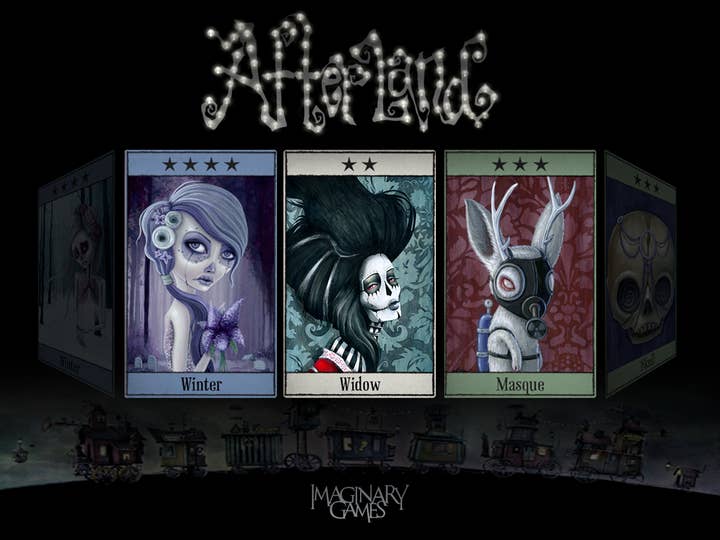
"We were interested in the ideas only really to the extent that we could match it to the team. So if you said 'we're going to make the next Halo, it's going to be amazing' and you're just three guys...The idea could be awesome, but there's no way that the two match. So the extent that we wanted to check the idea was that we wanted to validate that they have the experience, background and overall skill-set to execute the project. In fact, a couple of the teams didn't even really have a formal idea.
"For example: Double Stallion, in their previous incarnation as Crankshaft, had released a Steam game. Dan and some of the other guys had done mods and stuff, so they had experience of working together. They'd just shipped the Steam game and hadn't had time to come up with a new idea and the application deadline was coming, and they said 'here's who we are, we'll come up with something, can we still apply' - and we loved the team so much and had so much faith in their experience and camaraderie that we said, yeah, don't worry about it. You'll figure it out."
"Even the most experienced publishers get it wrong all the time. We looked at the talent, their history and what they'd done before"
Execution Labs is officially platform and payment model agnostic, to a certain degree, but practicalities and market movements mean that there are certain combinations which make more sense for small teams with limited financing.
"We're already focusing on mobile, because it's the right scale of project for the process we're creating," says Della Rocca. "We're also pushing them towards free-to-play and freemium business models. After that, we've not really dictated anything, we've left it open. We did say that we didn't want super-casual, we didn't want word games or match three, that sort of stuff. That's a different ball game in terms of having to really pump in mega dollars for user acquisition because you're going for such a broad audience, but after that we really left it open.
"At the end of it we looked at the teams that we'd picked and we had this really diverse spread of games, which I think is great, because we don't know what categories are going to have all the competition when the games are released. If we'd all picked action adventure games and Zynga put out five action adventure games, we'd be hosed. So it's good on a meta-level to have that diversity embedded.
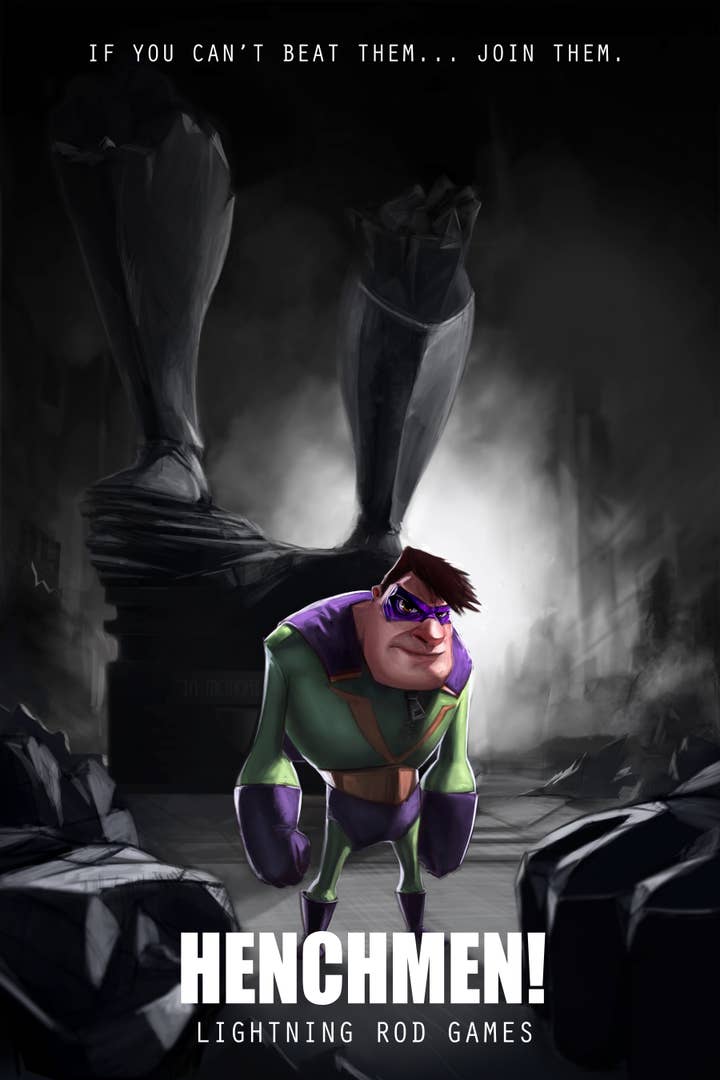
"So that was kind of an after-the-fact thing. We were really focused on the teams, but we're really pleased that we ended up with that."
Della Rocca and Katz themselves have plumbed for a two-part monetisation model. Firstly, they'll take a revenue cut from the games which are produced under their auspices. Once you've graduated, any new IP you generate after that first title is yours to keep. Part of the ongoing deal, however, is a small equity stake - which Della Rocca says helps to keep both parties interested in a mutually beneficial arrangement.
"It's not a big stake, and it's reliant on how long we fund them for," he explains. "So, for argument's sake, let's say it's between 10 and 15 per cent on average. So we own a piece of the company, which means that we are encouraged and incentivised to support them on a lifetime basis.
"Because we own a piece of them, we want to make sure that they get introductions to the right companies and access to investors in an ongoing form. It's what I'm calling alumni services. They've gone through the programme, they've graduated and they're in the wild. It's not like we're taking a revenue cut from everything they do in the future, nor that we take that cut, go to the bank and move on, either.
"Because we own a piece of them, we want to make sure that they get introductions to the right companies and access to investors in an ongoing form"
"We really want to support that company on an ongoing basis to grow and succeed. As they grow, the value of our stake grows - so not only are we engaged on a human level, because they're like our students, we're incentivised by that chunk of ownership. But to be clear, that's not a controlling stake, we're not on the board, we're not going to dictate how to run your business.
"If you make it big and succeed, we'll get our share of success for helping you in the early days."
As well as the expert guidance of Della Rocca and Katz, each team benefits from a network of mentors specialising in disciplines across the board, helping them to avoid the pitfalls of marketing, monetisation and user acquisition which can claim so many start-ups. Della Rocca, he tells me, arranged for the help of most of these to prove a point to investors - drumming up over 60 names after just one round of mails to industry friends.
"Getting industry members to get behind the project and share their knowledge has been wonderful, and I would say the easiest part of the whole endeavour. I think that really speaks to the games industry and the lengths to which, on the whole, we're a really sharing, collaborative community. The wealth of experience these guys are willing to share is phenomenal.
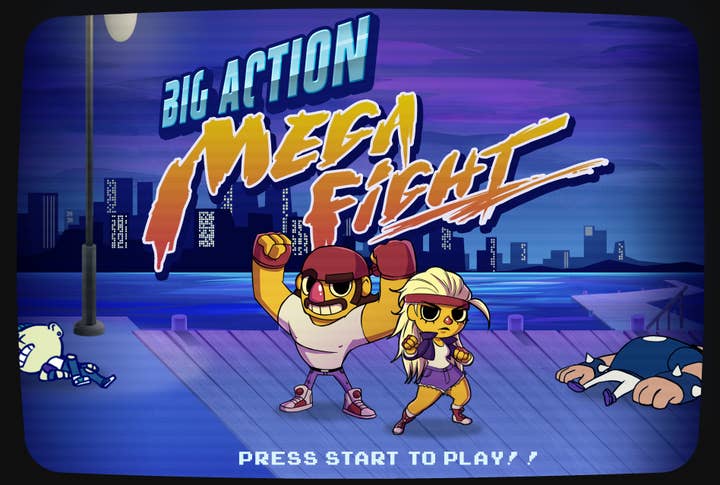
"Eric Zimmerman was in the lab a few weeks ago - arguably one of the best game designers on the planet, and he spent a whole day with the teams, really digging deep on their designs and challenging them on how they're going to engage the players. That's priceless, you can't pay for that. And he's doing that because he wants to. He loves supporting start-ups, he loves indie games.
"We do that every week, we have someone like that come in, whether it's design or business or monetisation, marketing, production, tech. Part of the process was choosing this repertoire of mentors who had these varying skills and areas of expertise. It's been our role to think, what do these teams need most, right now. So they need X now, then Y in a month and Z in two. That's something we've managed along the way."
As well as Zimmerman, the Labs are visited by both specialist and mainstream written press, as well as TV crews, other mentors and potential and current investors. Ouya boss Julie Uhrman also dropped by for a brown-bag lunch to present to 100 developers on-site and Zimmerman's own lecture drew a crowd of 150. In fact, says Della Rocca, they've had to implement a strict schedule to control the number of visitors.
"They loved the exposure, but they couldn't get work done. We hadn't thought about that. When someone from TV said, we want to come and film, we just said, yeah, come on back. But now we've limited the interruptions. So we've instituted flow days, where we keep a state of flow. Three days a week, we don't interrupt the teams. They manage their own schedules so we're not tapping on their shoulders every hour, saying, here's another journalist. Those days are sacred. The other two days are when we schedule journalists and mentors.
"I think this could be done, in some form, anywhere in the world"
"There's a real contrast, flow days are like a library, everyone is quiet. Non-flow days, there might be a dozen VCs, a TV crew and a bunch of students. In addition to that we've been very open, because we want to serve as this nexus point to the indie community."
Naturally, Canada seems like it might be a fairly unique proposition for a venture like this, combining the presence of both huge publisher studios and a thriving indie scene with all the attendant benefits of tax-breaks and a sympathetic government. With mentors aplenty on the doorstep, and Della Rocca himself in residence to oversee them, it seems like the perfect storm. Jason, though, thinks this could be implemented anywhere, with a little fine-tuning.
"I think this could be done, in some form, anywhere in the world," he muses. "It would have to be tweaked, though - because the model we designed was designed for the factors that exist in our eco-system - but the majority of the mentors that we have come from outside Montreal. Of the 90 we have, maybe only 15 are local, the rest are from elsewhere. There could be versions of me anywhere. We don't have government funding, we're fully venture-backed. We have two VCs from Canada, a VC from Europe and two angels from Asia that funded the project."
As far as help from the government is concerned, there are some good reasons that they've not been involved financially.
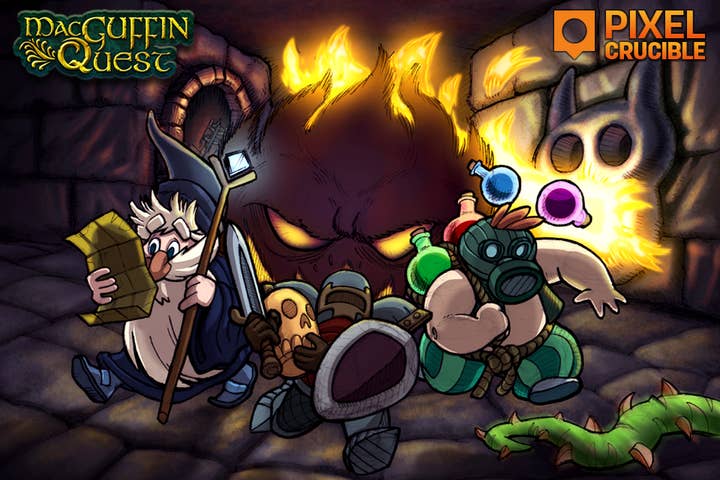
"What we're doing is kind of crazy and has never been done before. Although the government in Canada is super-supportive of the games industry as a whole, if I went to a government official and asked for funding for this crazy idea, they'd tell me I was nuts. They don't understand how to parse what we're doing, they'd tell us to sign up for tax breaks. But tax-breaks are useless for what we're doing. In sixteen months we'll qualify for tax-breaks and get a nice cheque from the government, but that's sixteen months from now, that's useless in terms of getting started. It's useless for the start-ups.
"So while the government has been super-curious and supportive in terms of being a cheerleader, what we're doing hasn't had a penny of government intervention. Don't get me wrong, if they said: 'here's a million bucks', I would take that in a heart-beat. We'll see. Now we're up and running, maybe we can have that discussion, but essentially we sold a napkin drawing to investors who believed in the vision and the story. Governments tend not to invest in napkin drawings.
"But the bottom line is: something like this can be done anywhere in the world, if it's designed specifically with that region, city or country in mind, if it's tweaked and optimised for the inputs and outputs available in that country. In fact, so much so that our current business plan is to open Execution Labs in other countries around the world, in really distant places. Places like Asia, Latin America, Europe.
"If you're in Brazil you've got no idea of how to get into China etc etc. That's part of our long term plan - to export the model with tweaks for local factors"
"We want to create this global network of supporting entrepreneurial talent, accessing local government centres and sources of funding, but also to open local markets to other areas audiences so that we can take games made in North America and take them to Brazil, or anywhere. So if you're just an indie in Canada, you've got no sense of how to get to market in Brazil. If you're in Brazil you've got no idea of how to get into China etc etc. That's part of our long term plan - to export the model with tweaks for local factors.
"That being said, it doesn't have to be us that does it. We're already seeing inklings of other accelerators and incubators popping up around the world. It's not an easy endeavor, you need the right ingredients, but it can be done."
The Teams
The first five studios selected by Execution Labs now all have their ideas finalised and in production, looking to hit a rough summer release window. Here's a brief summary of each team and the games they're making.
Miscellaneum Studios: The Firemasters
A five person team, Miscellaneum Studios is working on a "blazing 3D platformer about firefighters on a colonised Mars," creative director and co-founder Lateef Martin tells me. "You play as one of four characters which can be switched out on the fly. They all put out fires but all have different skills and abilities, allowing you to use them as a team to solve different tasks. You save people's lives, fight fires and fight fire-based creatures.
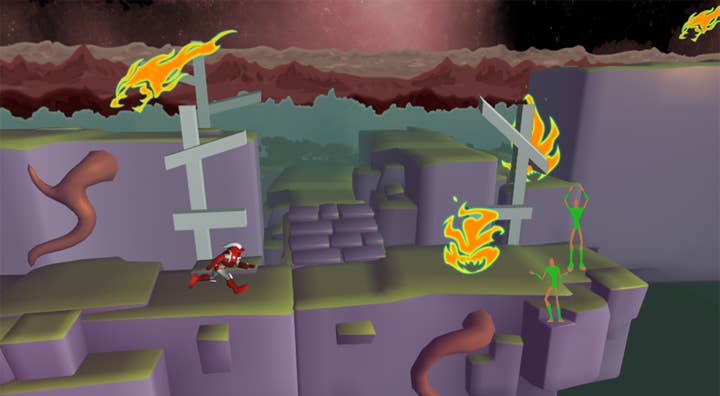
“It's free to play and you can get through the entire game without buying any content. However, it's a much richer experience if you do buy content. These are consumables, ammo, weapons, player skins. You can also buy additional characters who will come with three levels and a side-story.
“Those side-stories fall in with our transmedia vision, which is that we'll be producing graphic novels, animations and music. Each side-story is a comic book which comes with the extra characters, we're also doing an online comic that gives you insight into the characters, the world and the upcoming content. That will be live on the website before the game's release. In-between updates we'll also have comics."
Lightning Rod Games: Henchmen!
Lightning Rod's Mark Laframboise and Steven Smith are both experienced industry figures, moving on from positions at Playdom and EA to set up their own venture. Although they had the personal funding to remain self-sufficient for at least a year, the pair sought out Execution Labs for their first release.
Based on some design principles taken from board games, Lightning Rod hopes to capitalise on the rise of tablets to take advantage of the opportunities they provide for group play and the satisfaction which it provides.
"When we left Playdom and EA we did so because we wanted to make games which people play together"
Steven Smith, Lightning Rod Games
"So in Henchmen you take on the role of a super villain," says Laframboise, "trying to destroy your friends using your army of henchmen and your arsenal of traps. It's a free-to-play multiplayer game. We're really focused on bringing people together, so we're really excited by our local multiplayer mode where players sit across from each other on the same tablet. We're aware that you can't always be in the same room as your friends, so we've also got online synchronous play. Each game can be completed in just a few minutes, so you can play around your own schedule."
"It's all going to be 2D animation; our artist comes from television," continues Smith. "Execution Labs have given us access to this great mentor, Samantha Youssef, who was an animator at Disney. She's been helping us out with character design, so we're really excited to see where that goes."
Concerned about the ownership of IP and retaining control of their company, both founders admit that there was some trepidation about joining the scheme. "We almost walked away from it," says Laframboise. "We were very concerned about whether we were going to get enough out of it to justify the equity we were giving up. But it definitely paid off, we're very happy with it."
Double Stallion Games: Big Action Mega Fight
Daniel Menard, CEO of Double Stallion, thinks that some genres have been passed over by the rise of mobile and wants to see them return. A huge fan of the brawling games of the '80s and '90s, Menard is backing the genre for a somewhat ironic return to the limelight. "Despite the success of the App Store, we haven't seen much variety in what's being offered," he tells me. We're seeing endless runners and building games taking over. As mobile tech gets stronger, our vision is that we'll be able to bring the variety of experience that consoles have to the mobile platform.
"There are a few brawlers already in the App Store; a lot of them are ports of older games. They feel like they belong on a console instead of a mobile device: they have these on-screen controls, they're not free-to-play, they have no IAP. So we really wanted to tackle those problems and make a brawler with really solid touch controls that's free-to-play with IAP.
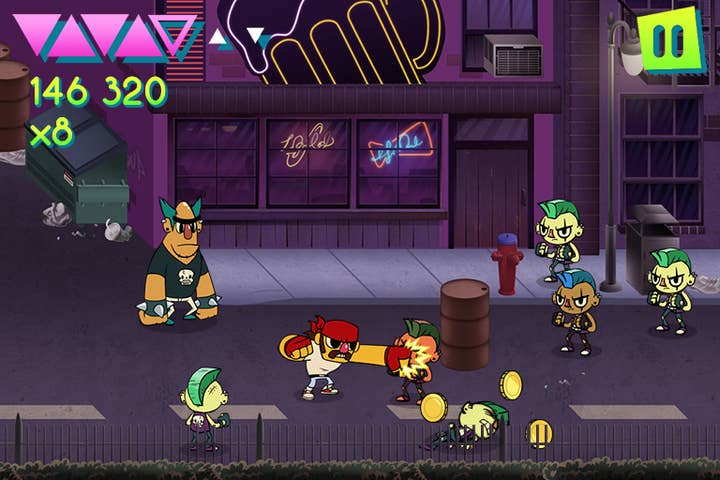
"So we took all of the ridiculousness of older games, like in Streets of Rage where you're eating street meat out of garbage cans, and just blew it up to be really B-Movie. We spent a lot time perfecting the controls for touch, so you can swipe to attack, tap to move. Then there are things like drawing a circle to throw. The direction of swipes is really important because it plays into the combo system. Left and right swipes will become punches, swipes up will be an uppercut and so on."
Despite having already released a Steam title and a series of fully-supported mods, Double Stallion still felt that there was worth in the sort of experience and access offered by the programme. "I think, being first-timers in the mobile space, we probably would have made a tonne of mistakes," says Menard. "Just having a safety net, someone who'll give you honest feedback on your game and make sure you don't repeat simple mistakes that a lot of indies make early on, I think that's going to make our company that much more successful. So far the experience has been really great."
Pixel Crucible: MacGuffin Quest
Mathieu Dumont of Pixel Crucible's idea for a dungeon crawler which sees the protagonists spending more time than not running away might seem like an odd one at first, but when he puts in the context of the famous boulder escape scene from Raiders of the Lost Ark, it starts to make sense. Descending ever further into danger in search of a the titular MacGuffin, players will "wake the evil" guarding the treasure once they grab it, triggering a frantic escape attempt.
"We're a team of four industry veterans: three programmers and one artist. We obviously have multiple roles, as a start up you have to be able to cover everything with a limited number of people"
Mathieu Dumont, Pixel Cruicible
"We really wanted to have a game that's intense, but in short bursts, because that's something that's not really on the App Store," says Dumont. "The App Store is more focused on casual games, so we wanted something that's more focused on the mid to hardcore demographic, something that we would play.
"We're a team of four industry veterans: three programmers and one artist. We obviously have multiple roles, as a start up you have to be able to cover everything with a limited number of people. We all come from different companies, but we've never launched a company ourselves, so we were missing experience in marketing, we didn't have many contacts - stuff like that. So that's why we applied to execution labs, stuff like that - we needed those missing pieces.
"We were planning for a couple of months to start our own company and go it alone. But, we were always trying to focus on the game and it was nagging us that we were lacking skills business-wise. When we heard about Jason's incubator, we basically jumped at the opportunity, we were really hoping to be accepted, although we would probably have gone indie anyway. But we would have made a lot of mistakes that we won't with Execution labs. We don't regret it at all, the experience has been amazing so far."
Imaginary Games: Afterland
Another studio with games already under its belt, Imaginary has felt the sharp end of the indie experience and isn't keen to repeat it. Co-founder Chris Powell is pragmatic about the experience. "Our game is Afterland, which is our fourth mobile game. Our last game was published by Chillingo. That was a big learning experience for us, because it was a pretty good game, which took a team of five eight months to make and made no money. It was pay to play, it was a 99c download. So we had to go back to the drawing board after that, to work out how to monetise.

"So we came up with an idea for a card game, which monetise really well - they've been working really well in Japan for a long time. They're not perfect, though - they're actually quite problematic. So we wanted to look at those games and pull out the fun bits and take away the negatives. It's been really hard, because when you add new parts like story or narrative, you break the flow of monetisation that happens with the compulsion loop. So we've had a challenge.
That story and narrative revolves around travelling carnivals in the afterlife, which are populated by co-founder Elin Jonsson and Megan Majewski's beautifully realised characters. However, as well as being a piece of art in their own right, each character will also have personality, helping the target demographic engage with them and immerse themselves in the world.
"Hopefully, our game has plenty of characters like that, continues Powell. "You get to know them and you start to love them, you get engaged. Our game can turn into an IP, I think. We're getting good traction on Facebook, we have 5000 likes. People are really digging the characters.
"We'd been seeking out mentors in Vancouver, which is really big with social and mobile gaming. We started a Unity meet up, and we actually got David Helgason to come to a meet up. The community in Vancouver is really good, so we'd started to network with some really interesting people, but we were really struggling with financing. Someone who's a previous VP of EA called us up and said, 'hey, there's a friend of mine, Jason, who's starting this incubator which would be a really good fit for you guys.' So that's how we started with Execution Labs."

